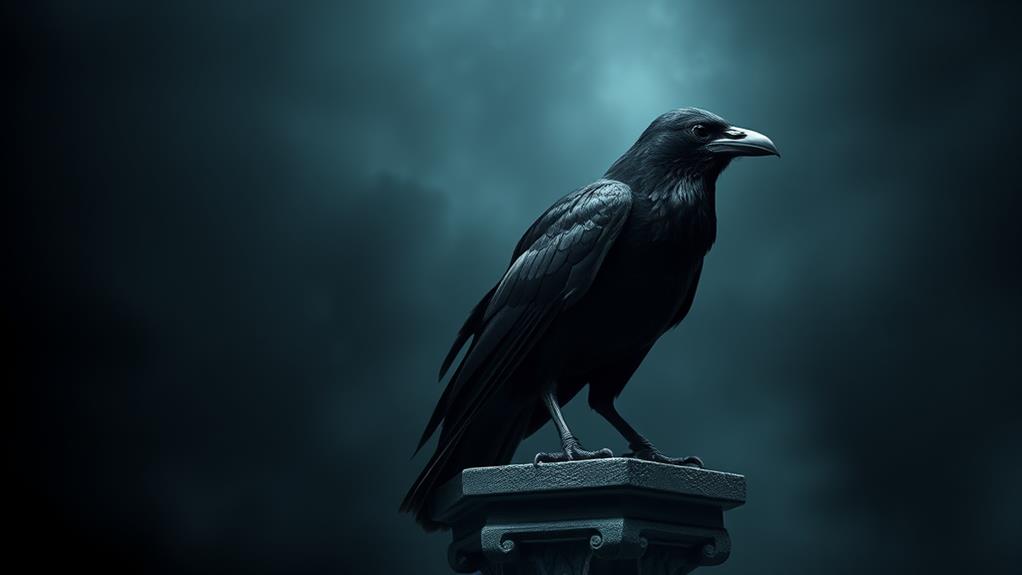Raven Name Meaning in the Bible
The raven’s name in the Bible, derived from the Hebrew word *’oreb* (עֹרֵב), holds a rich symbolic meaning, encompassing associations with death and destruction as well as providence, care, wisdom, hope, and renewal. Featured prominently in biblical narratives such as Noah’s Ark (Genesis 8:7), Elijah’s story (1 Kings 17:3-6), and Jesus’ teachings in Luke 12:24, the raven symbolizes God’s care and provision for all creation. Classified as unclean in Leviticus 11:15 and Deuteronomy 14:14, the raven also represents divine guidance and redemption. By exploring its appearances throughout the Bible, one gains a deeper understanding of the multifaceted symbolism and spiritual significance of this intriguing bird. As we explore its role in scripture, a complex and inspiring portrayal of divine care and provision unfolds.
Key Takeaways
- Biblical Symbolism: Ravens symbolize God’s care, provision, and mercy, transcending their physical nature to embody deeper spiritual significance.
- Cultural Interpretations: Ancient cultures viewed ravens as unclean and associated with death, yet in biblical contexts, they also represent divine care and resilience.
- Biblical References: Ravens are mentioned in Genesis 8:7 (Noah’s Ark), Elijah’s story in 1 Kings 17:3-6, Job 38:41, Psalm 147:9, and Luke 12:24, showcasing God’s care and provision.
- Symbolic Paradox: Ravens embody a multifaceted and paradoxical portrayal, combining aspects of death and darkness with divine care and mercy.
- Divine Provision: Through ravens, God demonstrates His unconventional yet reliable care for all creatures, emphasizing trust in divine provision and guidance.
Biblical Origins of the Raven

Numerous references to the raven are found throughout the Bible, with the bird first appearing in the account of Noah and the ark. In Genesis 8:7, Noah sends out a raven to search for dry land after the flood. This initial mention sets the stage for various symbolic meanings and biblical stories featuring the raven. The raven’s role in these narratives aligns with the themes of divine care and provision, highlighting the importance of trusting in God’s plan.
The raven is depicted as an “unclean” bird in Leviticus 11:15 and Deuteronomy 14:14, falling under the category of animals that were prohibited from consumption. However, despite this classification, the raven plays a pivotal role in several biblical narratives. In 1 Kings 17:3-6, ravens are commanded by God to provide for the prophet Elijah during a period of drought, demonstrating divine care and provision.
These stories illustrate the complex nature of the raven’s presence in the Bible, embodying both negative and positive symbolic meanings. While associated with death and detestation in some contexts, the raven also represents trust in divine providence and care, as highlighted in Luke 12:24, where Jesus mentions God’s provision for the ravens. The raven’s versatility in biblical symbolism underscores its significance in the scriptural narrative.
Raven in the Old Testament
In the Old Scripture, the raven is first mentioned in Genesis 8:7 as the bird sent by Noah from the ark to search for dry land, highlighting its importance as a symbol of exploration and resilience. The raven’s role in biblical narratives can also be seen as a reflection of strength, courage, and divine protection that resonates with the qualities associated with names like Robert.
The raven’s appearance in Leviticus 11:15 and Deuteronomy 14:14, where it is classified as an unclean bird, underscores its role in the biblical dietary laws. These references provide foundational insights into the symbolic and practical significance of the raven in biblical texts, where it is often associated with themes of divine provision and care, as seen in Job 38:41 and Psalm 147:9.
Biblical References
The raven makes its first appearance in the Old Scripture in Genesis 8:7, where Noah releases it from the ark to determine if the floodwaters have receded. This initial mention sets the stage for various references to the raven throughout the Bible, highlighting both its practical and symbolic roles. The raven, much like the name Caroline, symbolizes strength and resilience, emphasizing a deeper connection with the spiritual essence of life and divine care for all creatures, as seen in its symbolism and spiritual significance.
Biblical references to the raven often underscore its unique characteristics and behaviors, which contribute to its rich spiritual significance:
- *Dietary Prohibitions:* The raven is listed among the unclean birds in Leviticus 11:15 and Deuteronomy 14:14, indicating its forbidden status as food in the Hebrew dietary laws.
- *Divine Provision and Parenting:* Psalms 147:9 and Job 38:41 emphasize God’s care for the raven, particularly its young, suggesting a divine intervention in their sustenance and survival, reflecting a broader theme of divine provision and care.
- *Symbolism and Spiritual Significance:* The raven’s behavior and characteristics are used symbolically, such as in Proverbs 30:17, where it is noted for attacking the eyes of its victims, illustrating the consequences of disobedience, and in Luke 12:24, where it epitomizes God’s attentive care for all creatures.
These references weave together a multifaceted understanding of the raven, blending practical observations with deeper symbolic meanings in the biblical narrative.
Symbolic Interpretations**
Biblical descriptions of the raven offer a rich tapestry for symbolic interpretation, drawing on its behaviors and characteristics to convey profound spiritual messages. The raven’s role in providing for Elijah in 1 Kings 17:3-6 serves as a powerful example of God’s care and provision, even in times of hardship. This narrative underscores the spiritual significance of trust and reliance on divine guidance, similar to how the name Ashley reflects themes of divine grace and strength.
In Jewish tradition and biblical symbolism, the raven is often associated with God’s mercy and diligence in caring for all creatures, even those that seem abandoned or neglected. The verses in Job 38:41 and Psalm 147:9 highlight God’s intervention in nourishing young ravens when they cry out for food, illustrating the principle that God’s care extends to all life. The raven, though considered unclean, becomes a symbol of divine grace, emphasizing the universal scope of God’s love and care for every creature. Through these biblical accounts, the raven transcends its physical nature to embody a deeper spiritual significance.
The Raven’s Symbolic Significance

When exploring the symbolic significance of the raven in the Bible, it becomes evident that its portrayal is multifaceted and often paradoxical.
On one hand, the raven is associated with death and darkness, as seen in its appearance after the flood in Genesis 8:7, where it is sent out by Noah to check if the waters have receded. This symbolism is further underscored by its black color and carnivorous habits, as highlighted in Leviticus 11:15 and Deuteronomy 14:14, where it is classified as an unclean bird.
However, the raven also embodies spiritual wisdom and serves as a symbol of divine provision, as demonstrated in 1 Kings 17:3-6, where God commands ravens to bring food to Elijah. Additionally, in Job 38:41 and Psalm 147:9, the raven’s plight is used to illustrate God’s care for even the most seemingly neglected creatures.
Some key points to ponder about the symbolic significance of the raven include:
- *Association with Death and Darkness*: The raven is often linked to death and the mysterious, reflecting its dark color and scavenging habits.
- *Symbol of Divine Provision*: Ravens are depicted as messengers and providers, especially in the story of Elijah.
- *Paradoxical Nature*: The raven’s portrayal in the Bible juxtaposes its dark aspects with those of divine care and sustenance.
Divine Provision Through Ravens
The story of Elijah, who was cared for by ravens at the brook Cherith, exemplifies this theme. According to 1 Kings 17:4-6, ravens brought Elijah “bread and flesh in the morning, and bread and flesh in the evening,” demonstrating God’s miraculous sustenance. This act signifies not only God’s power to provide but also the raven’s role as a faithful executor of divine will.
This narrative underscores the concept of a faith test, where individuals must rely on God’s provision rather than their own abilities.
As Jesus mentions in Luke 12:24, “Consider the ravens; for they neither sow nor reap; they have neither storehouse nor barn; and God feeds them. Of how much more value are you than the birds?” This comparison highlights the raven’s dependence on divine provision, serving as a powerful reminder of God’s enduring care for His creation.
Ravens in the Life of Elijah

The narrative of Elijah’s life is deeply intertwined with the ravens that God commanded to feed him during his stay in the Cherith ravine. This uncommon method of divine provision not only underscores God’s sovereignty but also demonstrates how He can utilize the most unexpected creatures to meet the needs of His people.
Elijah’s trust in God’s unconventional means of care is a powerful example of the depth of faith required during times of solitude and uncertainty.
Ravens Obey God’s Command
God’s providence is vividly illustrated in the life of Elijah, particularly through His command over ravens. In 1 Kings 17:4, the Lord directs Elijah to a desolate brook, promising that ravens will bring him food. This remarkable event shows the divine control God exercises over all creatures, even those deemed unclean or predictive by nature.
- Divine Obedience: The ravens obey God’s directive without hesitation, bringing bread and meat to Elijah twice a day, morning and evening (1 Kings 17:6). This obedience underscores God’s sovereignty over creation and His ability to provide for His servants in extraordinary ways.
- Biblical Symbolism: The use of ravens as divine messengers is significant, as it highlights God’s care for even the least of His creatures. In Luke 12:24, Jesus emphasizes this by instructing believers to ponder the ravens, who do not sow or reap yet are fed by God.
- Unfailing Provision: The story also emphasizes God’s unfailing provision for Elijah, demonstrating that He can meet needs through the most unexpected means. This teaches us to trust in His providential care and to see His provision in all aspects of life.
This narrative reinforces the understanding that God’s provision is not constrained by human standards or expectations. In commanding ravens, God shows His power and grace in meeting the needs of His faithful servants.
Elijah’s Trust in Provision
Elijah’s unwavering trust in God’s provision is exemplified through his reliance on the ravens to bring him sustenance in the desolate brook Cherith. This remarkable story, captured in 1 Kings 17:2-6, underscores profound faith lessons about God’s provision trust.
In obedience to God’s command, Elijah retreated to the brook Cherith, a place far removed from the comforts and resources of civilization. Yet, despite these challenging circumstances, God declined to abandon His prophet. Instead, He chose to provide for Elijah through an unconventional means—ravens. These birds, not typically associated with benevolence or dependability, were divinely commanded to deliver bread and meat to Elijah, both morning and evening.
This narrative illustrates that God’s provision can be both unexpected and abundant. Elijah’s trust in God’s ability to supply his needs in the most unlikely ways protected him from fear and doubt. This story teaches us that our reliance on God’s provision must be rooted in an unshakeable trust in His sovereignty and grace.
In the face of uncertainty, we, like Elijah, can have confidence in God’s unwavering commitment to provide for all our needs. Through such trust, we are freed from the anxiety of provision and empowered to live in the freedom of faith.
God’s Unusual Care Methods**
Unconventional as it may seem, ravens played a pivotal role in Elijah’s life, serving as instruments of divine provision in the desolate setting of the brook Cherith. These mysterious messengers were directed by God to bring sustenance to Elijah, feeding him bread and meat twice a day. This remarkable event underscores God’s ability to utilize even the most unexpected means to provide for His people’s needs.
- Divine Guidance: The ravens were commanded by God to feed Elijah, demonstrating His sovereignty over all creatures.
- Sustenance in the Wilderness: The ravens brought food to Elijah in the morning and evening, illustrating God’s consistent and reliable provision.
- Unusual Care: The use of ravens, considered unclean birds in Jewish tradition, highlights God’s ability to redeem and use anything for His purpose.
This story emphasizes the theme of divine nourishment, where God uses unconventional means to care for His people. Elijah’s trust in God’s provision during this time is a reflection of the faithful nature of divine care.
The mysterious messengers, in this case, the ravens, serve as a symbol of God’s creative and unfailing provision in times of need.
Forbidden as Food in the Bible
Delving into the Old Covenant, specifically the book of Leviticus, reveals that certain foods were forbidden to the Israelites as part of their dietary laws. These restrictions served not only as health guidelines but also held spiritual symbolism, emphasizing the importance of purity and separation in the religious life of the Israelites.
Key dietary restrictions included the prohibition of animals that did not have both a split hoof and chew the cud. For instance, the camel, coney, and rabbit were unclean because they chewed the cud but did not have split hooves, while the pig was unclean because it had a split hoof but did not chew the cud. Additionally, marine creatures lacking fins and scales, along with certain types of birds and flying insects, were considered detestable and not permissible to eat.
These dietary laws were specific to the Israelites and were intended to distinguish them from other nations. However, with the advent of the New Covenant in Christianity, these food restrictions were deemed no longer applicable.
The focus shifted from dietary laws to the spiritual and moral purity of the believer, allowing for the consumption of all foods as long as they did not cause others to stumble in their faith.
Ravens and God’s Care for Creation

In examining the biblical references to ravens, it becomes evident that these birds hold a unique place in the scripture, particularly in illustrating God’s care for creation. The raven’s appearance in various narratives serves to underscore God’s providence and meticulous attention to all aspects of creation, from the smallest creatures to humanity.
- Illustration of Divine Care: The story of Elijah, where God commands ravens to feed him during a time of drought and solitude (1 Kings 17:4-6), highlights God’s ability to provide for His people, even through unconventional means.
- Environmental Stewardship: The raven’s adaptability and wide geographical distribution (Genesis 8:6-7) remind us of God’s hand in shaping and sustaining ecosystems, emphasizing our responsibility as stewards of the earth.
- Spiritual Lessons: Jesus’ reference to ravens in Luke 12:24, “Consider the ravens: they do not sow or reap, they have neither storehouse nor barn, and yet God feeds them. Of how much more value are you than the birds?” underscores the importance of trusting in God’s provision and care for all creatures, reinforcing spiritual lessons on faith and reliance.
Cultural and Historical Implications**
The depiction of ravens in the biblical narratives exposes rich cultural and historical layers that reveal the complex symbolism and associations attributed to these birds in ancient societies. Understanding these layers requires delving into mythological connections and religious beliefs that have shaped their depiction.
In the biblical context, ravens are often associated with death and destruction, yet they are also symbols of God’s care and providence. For instance, in the story of Elijah, ravens are depicted as bringers of sustenance, highlighting God’s ability to provide even in the most challenging circumstances.
The cultural significance of ravens is further underscored by their classification as unclean animals in Leviticus and Deuteronomy, which reflects ancient Jewish dietary laws. However, this designation does not diminish their symbolic importance, as they are also described as recipients of God’s bounty. For example, Psalm 147:9 and Job 38:41 emphasize God’s provision for young ravens, showcasing the divine care extended to all creatures, regardless of human categorizations.
These narratives underscore the multifaceted nature of ravens in biblical culture, encapsulating both fear and reverence, highlighting their place in the broader tapestry of religious beliefs and mythological connections.
Frequently Asked Questions
Is the Raven a Symbol of Good Luck in the Bible?
In the Bible, the raven is not inherently a symbol of good luck. Instead, it signifies God’s providential care and provision, particularly in stories such as Elijah’s feeding by ravens (1 Kings 17:4-6) and God’s care for ravens in Job 38:41 and Luke 12:24.
Why Are Ravens Frequently Associated With Death in Different Cultures?
“Death’s dark messenger,” the raven is often viewed as an omen of demise. Cultural beliefs globally associate ravens with death due to their scavenging nature, feeding on carrion, symbolizing destruction and ill fate, contrasting with rare instances of good luck symbolism.
How Is the Raven’s Intelligence Reflected in Biblical Stories?
In biblical stories, the raven’s intelligence is showcased through its resourcefulness and cleverness. For example, in the story of Elijah (1 Kings 17:4-6), ravens are commanded by God to feed the prophet, demonstrating their capability to follow divine instructions and provide sustenance in times of need.
Are There Any Similarities in Raven Symbolism Between Norse Mythology and the Bible?
Comparing Norse mythology and biblical symbolism, both cultures attribute intelligence and unique abilities to ravens. However, Norse mythology emphasizes wisdom and power, while biblical narratives often focus on God’s provision and care, despite varied cultural interpretations of its symbolism.
Can the Raven Also Symbolize Rebirth or Starting Anew in a Biblical Context?
In a biblical context, the raven can symbolize rebirth and starting anew through its association with Noah’s Ark. The raven’s release and subsequent return signifies the shift from chaos to a new creation, embodying themes of renewal and new beginnings.
Names Inspired by Nature and Spirit
Conclusion
The raven’s depiction in the Bible underscores its symbolic significance, reflecting both desolation and divine care. As an “unclean” bird in Leviticus and Deuteronomy, its function in providing for Elijah during famine exemplifies God’s impartial provision for all creatures. This paradox highlights the raven’s dual role: an emblem of death and desolation, yet a beneficiary of God’s care, pointing to the overarching theme of God’s unfaltering provision, underscoring that “actions speak louder than words.”






